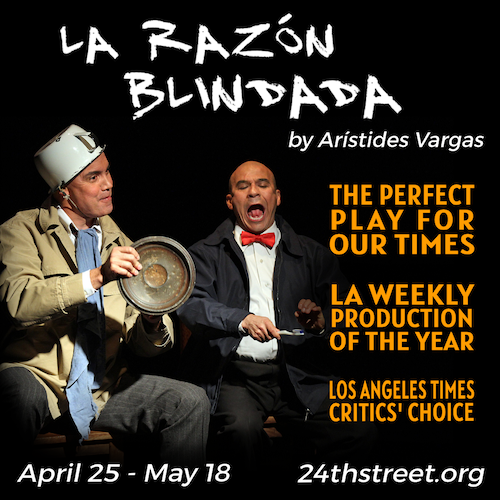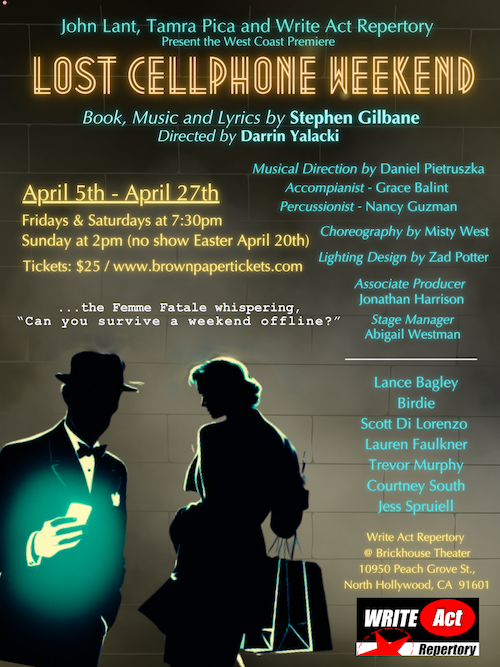Kim’s Convenience
Reviewed by Steven Leigh Morris
Laguna Playhouse
Through Oct. 9
RECOMMENDED
Born in the 2011 Toronto Fringe Festival, Korean-Canadian scribe Ins Choi’s widely produced family comedy (spurring a spinoff sitcom on Canadian TV and Netflix) is a paeon to family. It clearly fills a hunger to reinforce embattled institutions (family businesses and family bonds), against children’s quest for independence as well as the pressures of gentrification — and it does so with a fair amount of wit and charm. Future productions of this comedy could likely be funded by any city’s small business administration.
You might call it an answer to so many 20th century dramas that call into the question the sundry power plays and perversities that entrap people in families and the stubborn, oppressiveness of family patriarchs – from Arthur Miller’s Death of a Salesman, to Tennessee Williams’s A Streetcar Named Desire to August Wilson’s Radio Golf.
In Choi’s comedy, the Number One estranged son, Jung Kim (Gavin Kawin Lee), returns home from years-long exile after a fight with dad. It’s the same plot as in Death of a Salesman. In Miller’s play, there is no family business, but there’s considerable chatter about starting one, as though that is the embodiment of family values. Arthur Miller sees it as a mirage. Ing Choi sees it as both a rescue and a kind of salvation of core values.
Apples and oranges? Not really. Both plays have a devoted yet spirited matriarch (Janet Song in Kim’s Convenience) who also serves as diplomat between warring parties. There’s ample reason to believe that patriarch Appa Kim (Yong Kim) is every bit as calcified as Miller’s Willy Loman. Before Jung’s return, Appa pressures his daughter Janet (Susanne Lee) to take over the local convenience store he created, defying a flattering market-value offer for the store in the gentrifying Canadian neighborhood, an offer made by a local entrepreneur (Clinton Lowe), who aims to demolish the store as part of a new, upscale housing development (Radio Golf, anybody?)
To its credit, and without being reductive, the play doesn’t shy away from the cantankerous Appa’s profiling of Blacks: indeed, his daughter witnesses with horror her dad’s factually baseless yet intuitive and accurate accusation against a Black store thief (Lowe). That portrait is offset by Lowe’s earlier portrayal of an entirely honorable Black customer, not to mention the businessman with an offer to buy the store (an offer he hopes Appa can’t refuse) plus Janet’s endearing child-sweetheart boyfriend, now working as a local cop. Indeed, Lowe is pulled into quadruple duty, ably capturing the different essences of four characters – and the only actor who plays more than one role.
Director Jon Lawrence Rivera gets to the play’s heartbeat through the show’s sitcom style and the characters’ thick cultural layers of emotional self-protection. Janet has to place her dad in a painful arm lock (learned from her cop boyfriend) in order to get him to thank her for the volunteer time she’s dedicated to their store, and to have him admit that he actually loves her. (She can say it to him without having her arm twisted, she argues.) Whether this a generational or a cultural issue, there’s no doubt the Korean characters are cloistered, contrasted against the effervescent Black men portrayed by Lowe. It would seem such stiffness would be an impediment to the play’s nostalgia, which borders on sentimentality. And yet it has the opposite effect, perhaps because the portrayals are so authentic – even if Appa tries to hand off the store-keys to his son with no training, like Willy Wonka handing Charlie the keys to his chocolate factory. This dimension is quite wistful.
Rivera serves what authenticity the play possesses by employing You-Shin Chen’s striking and ever-so-literal set design of the shop: stocked shelves, wall-to-wall detail, including the little ding that goes off whenever the front door gets opened. Magic realism this ain’t. And still, the play traffics in what Arthur Miller would have called mirages – that small businesses can hold out against mega-corporate interlopers, that the community will hold and that the family will prevail. No wonder it’s so popular.
Laguna Playhouse, 606 Laguna Canyon Drive, Laguna Beach. Wed.-Fri., 7:30 pm, Sat., 2 & 7:30 pm, Sun. 1 & 5:30pm. Added perf. Tues., Oct. 4, 7:30 pm; thru Oct. 7. https://lagunaplayhouse.com














